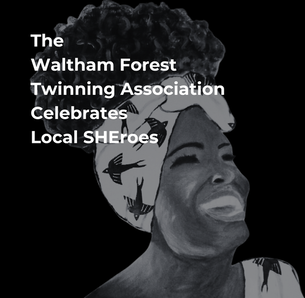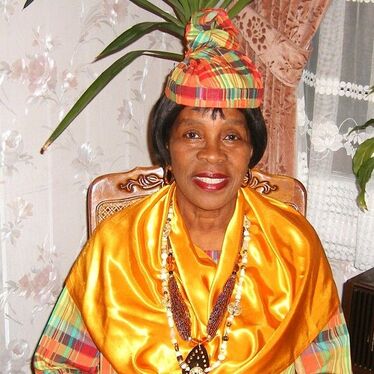The theme for Black History Month 2023 is Celebrating our Sisters / Saluting our Sisters / Matriarchs of Movements #WeMatter
As part of our #BHM23: #WeMatter WFTA Celebrates Local SHEroes project in partnership with Waltham Forest Council, we have worked with four Waltham Forest schools to produce artwork and/or poetry inspired by our nine SHEroes pictured below.
All student contributions are featured in our virtual exhibition you can explore and interact with HERE.
Here are their inspiring stories:
All student contributions are featured in our virtual exhibition you can explore and interact with HERE.
Here are their inspiring stories:
Ethelca Brand OBE, MSA - Former Civil Servant and Community Activist
“Colour shouldn’t be a deterrent; strength and motivation are the driving forces.”
|
Ethelca Brand OBE, MSA, was awarded an OBE in Her Majesty the Queen’s 90th Birthday Honours List on 10 June 2016 for Services to the Community in London. An OBE is a Queen’s honour given to an individual for a significant local role in any business, charity or public sector activity. OBE stands for Officer of the Most Excellent Order of the British Empire. Mrs Brand was born in Dominica and left in 1956 for London. Initially, she left Dominica with a view to practising nursing but instead had a long and distinguished career in the Civil Service before her retirement in 1995.
Mrs Brand has been a member of Dominica Overseas Nationals Association (D.O.N.A.) since 1979 and was Chairman for over 25 years. Her voluntary and community work for over 40 years includes fund-raising for Dominica at the Notting Hill Carnival for 18 consecutive years, as well as being a member of the British Caribbean Association (“BCA”), West Indian Standing Conference (“WISC”), United Anglo-Caribbean Association (“UACS”) and the Waltham Forest, Antigua & Barbuda and Dominica Twinning Association in London, holding executive positions within each association. |
Despite being one of the elder states people in the Dominica Community in London, Mrs Brand mobilised resources, food and clothes to be sent to Dominica in the aftermath of Tropical Storm Erika in 2015 and Hurricane Maria in 2017 and worked closely with the Dominica High Commission in London to organise affairs, given her experience in dealing with Hurricane David in 1979. She has also been a dedicated member of the DONA quadrille dancers for many years ensuring that Dominican culture is shared and maintained. Mrs Brand is now a triple honour holder, having received the Meritorious Service Award (“MSA”) from the Prime Minister of the Commonwealth of Dominica, Dame Mary Eugenia Charles, in 1988 on the occasion of the Commonwealth of Dominica’s 10 Anniversary of Independence; a Member of the Order of the British Empire (“MBE”) for Services to Community Relations in The Queen’s New Year’s Honours List in 2000, and then the OBE.
Marie Gentles OBE – Education Professional and Behavioural Management Specialist
"Be what you want to see in others & take time to look after your mind."
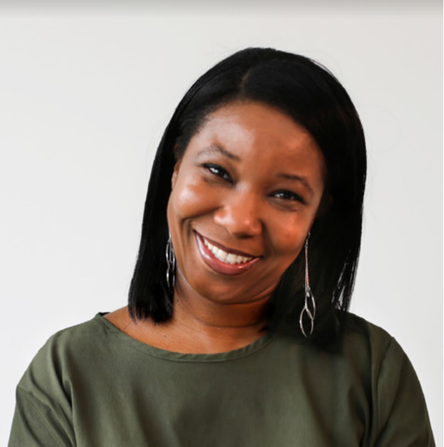 Marie Gentles OBE
Marie Gentles OBE
Marie qualified as a classroom teacher, then, over ten years, worked her way up professionally to become a middle leader in schools, then a senior leader and eventually a Head Teacher. Her school became Ofsted Outstanding, and the students' progression became recognised nationally by the Department of Education and the national press. This led to her OBE award, TV documentaries, and a book deal. All these achievements meant a broader platform for her to support, inspire and empower others.
Her three key moments are becoming a respite foster carer for some time, having her children and learning from them almost as much as she was teaching them! And her mum got dementia, which changed her entire perspective on life.
Challenges she has faced in her career include becoming pregnant with her first child in her very first year of teaching - this taught her about balancing responsibilities and that “we can do or be anything we choose. We can change our perspectives from obstacle to overcome so that the very thing that looks like a hindrance becomes the motivator”. Being a woman of colour - instead of seeing herself as 'disadvantaged,' she sees every challenge as an opportunity for growth. She genuinely believes that we are all uniquely different for a reason: we ALL have something to offer, even if we haven't yet figured out what that is. There is enough room for us all to shine, and when your purpose becomes your work, challenges become moments to expand our minds.
Her work and contributions have positively impacted her community by providing hope and opportunities for hundreds of young people and their families. Supporting changing minds/perceptions regarding how to help children and young people better and empowering others to feel like they 'can do.'
Her advice to young Black women would be to take what she calls the path of least resistance. If you're scared to take a leap, weigh which 'feels' better, not safer! Staying where you are or venturing on? Which feels better, and so is the path of least resistance. And be kind to yourself; she took various bold steps in her career. “The path of least resistance was to remain where I was and collate more experience, etc., which was fine”. Still, eventually, she knew that the scales had tipped the other way and that fear would naturally be a part of taking new steps towards her goals, but now, what would feel better was to take those steps.
She believes that we are all humans doing our best from where we are. Things have improved, but there is still a way to go. However, she works daily on her mental well-being, allowing her to face challenges from a far better place. It's taken her a long time to fully comprehend that everything to validate herself is “within me and not outside me. This helps me navigate the world and protect my energy for good”. She believes that individuals and communities can better support and uplift the voices and experiences of Black women by finding ways to connect and help one another. Share stories and build positive communities.
Her three key moments are becoming a respite foster carer for some time, having her children and learning from them almost as much as she was teaching them! And her mum got dementia, which changed her entire perspective on life.
Challenges she has faced in her career include becoming pregnant with her first child in her very first year of teaching - this taught her about balancing responsibilities and that “we can do or be anything we choose. We can change our perspectives from obstacle to overcome so that the very thing that looks like a hindrance becomes the motivator”. Being a woman of colour - instead of seeing herself as 'disadvantaged,' she sees every challenge as an opportunity for growth. She genuinely believes that we are all uniquely different for a reason: we ALL have something to offer, even if we haven't yet figured out what that is. There is enough room for us all to shine, and when your purpose becomes your work, challenges become moments to expand our minds.
Her work and contributions have positively impacted her community by providing hope and opportunities for hundreds of young people and their families. Supporting changing minds/perceptions regarding how to help children and young people better and empowering others to feel like they 'can do.'
Her advice to young Black women would be to take what she calls the path of least resistance. If you're scared to take a leap, weigh which 'feels' better, not safer! Staying where you are or venturing on? Which feels better, and so is the path of least resistance. And be kind to yourself; she took various bold steps in her career. “The path of least resistance was to remain where I was and collate more experience, etc., which was fine”. Still, eventually, she knew that the scales had tipped the other way and that fear would naturally be a part of taking new steps towards her goals, but now, what would feel better was to take those steps.
She believes that we are all humans doing our best from where we are. Things have improved, but there is still a way to go. However, she works daily on her mental well-being, allowing her to face challenges from a far better place. It's taken her a long time to fully comprehend that everything to validate herself is “within me and not outside me. This helps me navigate the world and protect my energy for good”. She believes that individuals and communities can better support and uplift the voices and experiences of Black women by finding ways to connect and help one another. Share stories and build positive communities.
Pauline Campbell - Principal Litigation Lawyer, Waltham Forest Council and Author
“Nothing changes if nothing changes.”
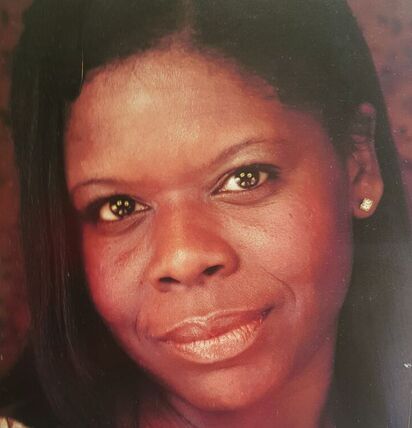 Pauline Campbell
Pauline Campbell
Pauline left school with virtually no qualifications after being told by a teacher she wasn’t ‘university material’. It wasn’t until age 33 that she started her law degree, and at 41, she qualified as a lawyer. Pauline is now a Principal Lawyer for Waltham Forest Council. She is a genuine beacon for change, using every opportunity and platform to spread hope and belief and inspire action and accountability. In her published book “Rice & Peas and Fish & Chips”, she honours her Caribbean migrant parents for the solid upbringing they provided. Amid adversity, they were daily examples of integrity, self-respect and determination that are a fundamental part of who she is today.
The challenges she has faced in her career were tackling pre-conceived ideas that people held regarding her ability and finding the confidence within herself to overcome them. Her passion for change has led her to volunteer her legal expertise to important causes. She began working pro bono for the Windrush Justice Clinic as a supervisor to third-year law students in 2021, handling intense cases and facilitating appointments with clients who, due to their own traumatic experience of the Home Office’s Windrush scandal, often had little or no trust in authority. In May 2021, she volunteered for the WF Twinning Association’s Windrush Reach Project, providing much-needed legal advice and support to the programme and directly to clients living in Waltham Forest. She has also provided several seminars on Windrush to organisations, including the National Education Union and the Law Society of Scotland.
Her advice to young Black women is that you must be strongest at the beginning of your journey because that is when you may harbour the most doubts and lack of confidence, and negative voices around you can break you down. Stay strong because once you have started on that road, it will be easier to stay on it. She believes that diversity, equality, and inclusion are essential (DEI) in various fields and Industries and for her, American activists and author Maya Angelou said it best: “We all should know that diversity makes for a rich tapestry, and we must understand that all the threads of the tapestry are equal in value no matter their colour; equal in importance no matter their texture." She stands by that mantra. She believes that individuals and communities can better support and uplift the voices and experiences of Black women only one way. Through supporting each other and building strong networks for those who follow.
The challenges she has faced in her career were tackling pre-conceived ideas that people held regarding her ability and finding the confidence within herself to overcome them. Her passion for change has led her to volunteer her legal expertise to important causes. She began working pro bono for the Windrush Justice Clinic as a supervisor to third-year law students in 2021, handling intense cases and facilitating appointments with clients who, due to their own traumatic experience of the Home Office’s Windrush scandal, often had little or no trust in authority. In May 2021, she volunteered for the WF Twinning Association’s Windrush Reach Project, providing much-needed legal advice and support to the programme and directly to clients living in Waltham Forest. She has also provided several seminars on Windrush to organisations, including the National Education Union and the Law Society of Scotland.
Her advice to young Black women is that you must be strongest at the beginning of your journey because that is when you may harbour the most doubts and lack of confidence, and negative voices around you can break you down. Stay strong because once you have started on that road, it will be easier to stay on it. She believes that diversity, equality, and inclusion are essential (DEI) in various fields and Industries and for her, American activists and author Maya Angelou said it best: “We all should know that diversity makes for a rich tapestry, and we must understand that all the threads of the tapestry are equal in value no matter their colour; equal in importance no matter their texture." She stands by that mantra. She believes that individuals and communities can better support and uplift the voices and experiences of Black women only one way. Through supporting each other and building strong networks for those who follow.
Bernice Burton MBE - Former Healthcare Professional
“Stand up for ourselves. Believe in our abilities. Put ourselves forward more often. Uplift your community.”
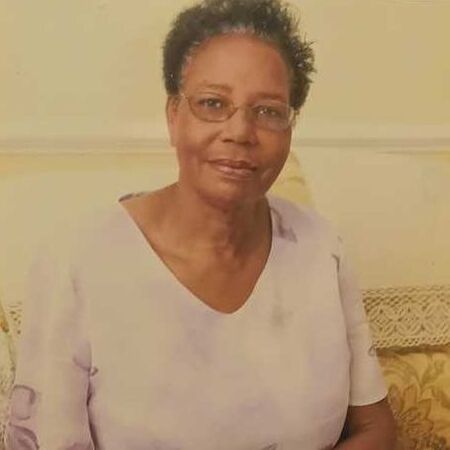 Bernice Burton MBE
Bernice Burton MBE
Bernice first wanted to be a nurse when she was in high school. She directly applied to the Matron of the Royal Hospital in Richmond, Surrey, to complete a 3-year State Registration Nurse training course, which she started in February 1967 when she arrived in the UK. As part of the training, it included going out with the District Nurse and Health Visitor. From this, she decided to become a Midwife. Bernice was the first nurse from her training hospital to complete the Part 1 Midwifery Course at Kings College Hospital. She went on to complete Part 2 at West Suffolk General Hospital and found the Community Module the most enjoyable. Her key posts included midwifery at Ilford, Essex. The next was as a School/Clinic Nurse in Waltham Forest whilst waiting to undertake the Health Visiting Course at the Northeast London Polytechnic.
Other key moments in Bernice's career were becoming a Health Visitor as they were and continue to be Registered Nurses who work in Community Public Health Services. Bernice's family are essential to her, so health visiting allowed her to ‘mother’ her child while developing her career. Family experience also helped her to create a genuine interest in the public, health, family, and mothers. Bernice’s career challenges involved dealing with officials and systems to help people in social need while they were in their homes. Challenges like the perennial problems of racism, mistrust and apathy could reduce or prevent the effectiveness of the work. Finding ways to overcome such adversities could present severe challenges in these cases. Like so many Caribbean nurses, professional advancement was always challenging. Bernice still meets people who tell her how beneficial her work with them is. Some of her work has been used as far away as Scotland.
Another positive achievement that makes her legacy is that she established the first community-based brain scanning service for children with severe Sickle Cell Disorders in the UK. Bernice's advice would be not to accept limitations. Expand your horizons to other areas of healthcare, not just nursing. There are many different career opportunities. She believes that we need more diverse representation in all professions. We need to stand up for ourselves more. We must be knowledgeable and professional in our approach to know these careers. It is a steep learning curve which we cannot do alone. We must network with those who know; we must ‘have a go’ and challenge ourselves to leave our comfort zone. We must encourage, support and educate others coming up behind us. Bernice believes that for individuals and communities to support and uplift the voices and experiences of Black women, they need to be an activist, contribute and donate, be a member of various associations, encourage others to participate, and inspire young people. Where possible, encourage, applaud and appreciate their efforts.
Other key moments in Bernice's career were becoming a Health Visitor as they were and continue to be Registered Nurses who work in Community Public Health Services. Bernice's family are essential to her, so health visiting allowed her to ‘mother’ her child while developing her career. Family experience also helped her to create a genuine interest in the public, health, family, and mothers. Bernice’s career challenges involved dealing with officials and systems to help people in social need while they were in their homes. Challenges like the perennial problems of racism, mistrust and apathy could reduce or prevent the effectiveness of the work. Finding ways to overcome such adversities could present severe challenges in these cases. Like so many Caribbean nurses, professional advancement was always challenging. Bernice still meets people who tell her how beneficial her work with them is. Some of her work has been used as far away as Scotland.
Another positive achievement that makes her legacy is that she established the first community-based brain scanning service for children with severe Sickle Cell Disorders in the UK. Bernice's advice would be not to accept limitations. Expand your horizons to other areas of healthcare, not just nursing. There are many different career opportunities. She believes that we need more diverse representation in all professions. We need to stand up for ourselves more. We must be knowledgeable and professional in our approach to know these careers. It is a steep learning curve which we cannot do alone. We must network with those who know; we must ‘have a go’ and challenge ourselves to leave our comfort zone. We must encourage, support and educate others coming up behind us. Bernice believes that for individuals and communities to support and uplift the voices and experiences of Black women, they need to be an activist, contribute and donate, be a member of various associations, encourage others to participate, and inspire young people. Where possible, encourage, applaud and appreciate their efforts.
Councillor Elizabeth Baptiste - Past Waltham Forest Mayor 2021-22
“Be passionate about something and do something about it. Being on top is challenging but worth it.”
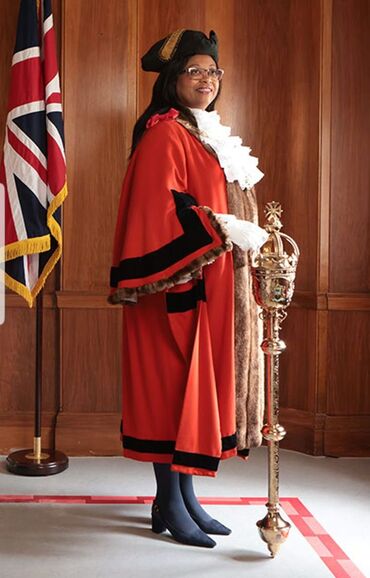 Councillor Elizabeth Baptiste
Councillor Elizabeth Baptiste
Three key moments that shaped who Elizabeth is today are finishing university for her undergraduate and postgraduate degrees, actively engaging in union activities, which led to her getting involved in local government and politics and leaving her previous job at Westminster University.
She was desperate to change her career and wanted to get into human resources but had no idea where to start or what to do. So, she chatted to a colleague who advised her to reach out to at least four senior managers in the university and request for them to be her mentor. Once she did this, she was fortunate the Director of Organisational Development agreed to be her professional mentor, guiding her through the process she needed to follow to become a Human Resource Specialist. She then obtained her Master’s degree in 2013 in Human Resource Management and became an Equality, Diversity, and Inclusion Adviser.
When Elizabeth became the Mayor of the London Borough of Waltham Forest during the municipal year 2021/2022, she supported charities, including the Sickle Cell Society. As well as raising funds, she initiated a project that involved Secondary schools in the borough to bring about awareness of Sickle Cell Disease. This benefited the community across Waltham Forest. Elizabeth believes that often, we have an idea of what we want to do but sometimes lack courage. She believes that if you gather the courage to follow your dreams and don’t let anyone convince you that your plan or your vision is not significant. Create a daily mantra
for yourself. She tells herself every day ‘I am too blessed to be stressed’ and ‘I have more than enough skills and experience to do this job.” Once you have set your mind or have a rough idea of what you want to do, reach out to those around you doing the job.
She was desperate to change her career and wanted to get into human resources but had no idea where to start or what to do. So, she chatted to a colleague who advised her to reach out to at least four senior managers in the university and request for them to be her mentor. Once she did this, she was fortunate the Director of Organisational Development agreed to be her professional mentor, guiding her through the process she needed to follow to become a Human Resource Specialist. She then obtained her Master’s degree in 2013 in Human Resource Management and became an Equality, Diversity, and Inclusion Adviser.
When Elizabeth became the Mayor of the London Borough of Waltham Forest during the municipal year 2021/2022, she supported charities, including the Sickle Cell Society. As well as raising funds, she initiated a project that involved Secondary schools in the borough to bring about awareness of Sickle Cell Disease. This benefited the community across Waltham Forest. Elizabeth believes that often, we have an idea of what we want to do but sometimes lack courage. She believes that if you gather the courage to follow your dreams and don’t let anyone convince you that your plan or your vision is not significant. Create a daily mantra
for yourself. She tells herself every day ‘I am too blessed to be stressed’ and ‘I have more than enough skills and experience to do this job.” Once you have set your mind or have a rough idea of what you want to do, reach out to those around you doing the job.
So, if it's politics, reach out to your local MP or councillor and ask the relevant questions to get you where you need to be. She did this, and look where she is today! Elizabeth started her career in higher education, and one of the things that stood out for her was the lack of Black professors in Higher Education. Because of her activities in the Union (UNISON), she was able to speak on that topic at various conferences to fight for change.
Here is some information: In 2021-22, there were 285 Higher Education providers in the UK, and stats taken from HESA state the following on ethnicity:
• White Professors 18,710
• Black Professors 160
• Asian Professors 1,580
• Mixed Professors 335
• Other Professors 350
• Not Known Professors 1,720
These stats paint a picture or tell a story about EDI in Higher Education. The same applies to politics. For example, in the UK Parliament and Government, 66 non-white MPs. Forty-one are Labour and 23 are Conservatives. Significantly, more than half, 37 of the 66 non-white MPs are women. She believes that individuals and communities can better support and uplift the voices and experiences of Black women by elevating the voices through storytelling. This should not be
done only during Black History Month but throughout the year. The silencing of Black women's voices significantly impacts our health and well-being. In a nutshell, we must tell our own stories. It’s the only way to make an impact. Our stories are important, and sharing that story with our whole community is essential.
Here is some information: In 2021-22, there were 285 Higher Education providers in the UK, and stats taken from HESA state the following on ethnicity:
• White Professors 18,710
• Black Professors 160
• Asian Professors 1,580
• Mixed Professors 335
• Other Professors 350
• Not Known Professors 1,720
These stats paint a picture or tell a story about EDI in Higher Education. The same applies to politics. For example, in the UK Parliament and Government, 66 non-white MPs. Forty-one are Labour and 23 are Conservatives. Significantly, more than half, 37 of the 66 non-white MPs are women. She believes that individuals and communities can better support and uplift the voices and experiences of Black women by elevating the voices through storytelling. This should not be
done only during Black History Month but throughout the year. The silencing of Black women's voices significantly impacts our health and well-being. In a nutshell, we must tell our own stories. It’s the only way to make an impact. Our stories are important, and sharing that story with our whole community is essential.
Sam Francis - CEO, Artistic Director, Filmmaker and Choreographer of X7eaven Academy
“Own your dreams, visualise every step believe in the gifts you have been given by the universe; they are yours for the taking”
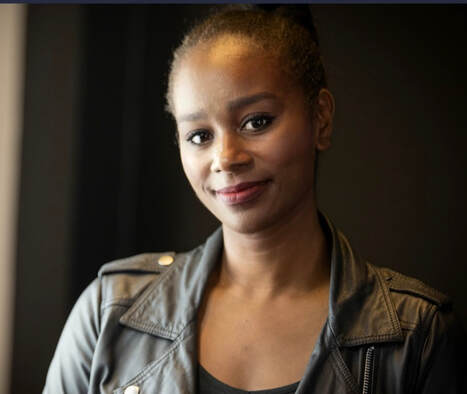 Sam Francis
Sam Francis
Sam Francis is the CEO and Artistic Director of X7eaven Academy, a pioneering award-winning performing arts school based in East London. Music has always been a passion within her family, whether it's the sound of vinyl turntables spinning at family gatherings or the melodies pouring out of shop doorways. Dancing and singing at any given moment seemed to be her destiny.
X7eaven works with the Barbican, Waltham Forest Council, Waltham Forest College, Hackney Empire and Several Schools across London, delivering bespoke performing arts workshops, Arts Awards Accreditations, BTEC level 2 and high-quality visual productions, and running a Saturday Performing Arts school. Sam’s passion lies in storytelling, allowing everyone to have a voice through the magic of performing arts. She has extreme pride that X7eaven has been the vehicle for hundreds of young artists to move on to the professional stage, TV and Film. Her vision for X7eaven is that everyone deserves to ‘Dare 2 Dream’. Through the support of her mother and family, she was fortunate to receive training at prestigious performing schools in London including the Urdang Academy, thanks to a scholarship.
As a dancer, choreographer and director, she has worked with and for the best in the industry, developing commercial recording artists. Sam trained at Urdang Academy and has worked in the music industry as a performer, choreographer and writer/director for many years. She has been lucky to have started her career as a dancer, actress, and singer. She has had the opportunity to tour the world in colossal arenas with pop artists such as Sean Paul, Beyoncé, Destiny's Child, East17, Boyzone, Styles and Breeze, Phixx, Mark Morrison, P Diddy, Worlds Apart and LL Cool J. She is choreographing and working on the Brits and MOBO Awards, music videos, and appearances on numerous international TV shows. Sam has written and directed several original productions that the Barbican Borough of Waltham Forest and neighbouring boroughs and theatres around London have commissioned. Sam’s accolades include her choreography being showcased across the world. Her work on the award-winning ‘A Midsummer Madness’ was performed in New York, London and at the Edinburgh festival by the talented cast of Hackney Harlem. Sam also co-choreographed the pantomime ‘Dick Whittington & his Cat’ at the prestigious Hackney Empire.
She runs an award-winning performing arts academy, a role she has held for 17 years. They take pride in nurturing the talents within their community, and many of their artists have graced TV shows, West End stages, music videos, and more.
Her aim has always been to reach a wide audience; lately, she has been focusing on creating films that touch people's hearts and convey stories that resonate with effective communication. Currently, she is in the process of editing and finalising her latest short film, titled "Reset Your Mind," which tells a beautiful story about Black classical musicians.
Her advice to the next Black woman who embarks on this profession is simple: Embrace your compassion. As you navigate your journey, inevitably, mistakes will occur, but don't forget that the strength of your experiences is unmatched. It's this very uniqueness that will set you apart from the rest.
X7eaven works with the Barbican, Waltham Forest Council, Waltham Forest College, Hackney Empire and Several Schools across London, delivering bespoke performing arts workshops, Arts Awards Accreditations, BTEC level 2 and high-quality visual productions, and running a Saturday Performing Arts school. Sam’s passion lies in storytelling, allowing everyone to have a voice through the magic of performing arts. She has extreme pride that X7eaven has been the vehicle for hundreds of young artists to move on to the professional stage, TV and Film. Her vision for X7eaven is that everyone deserves to ‘Dare 2 Dream’. Through the support of her mother and family, she was fortunate to receive training at prestigious performing schools in London including the Urdang Academy, thanks to a scholarship.
As a dancer, choreographer and director, she has worked with and for the best in the industry, developing commercial recording artists. Sam trained at Urdang Academy and has worked in the music industry as a performer, choreographer and writer/director for many years. She has been lucky to have started her career as a dancer, actress, and singer. She has had the opportunity to tour the world in colossal arenas with pop artists such as Sean Paul, Beyoncé, Destiny's Child, East17, Boyzone, Styles and Breeze, Phixx, Mark Morrison, P Diddy, Worlds Apart and LL Cool J. She is choreographing and working on the Brits and MOBO Awards, music videos, and appearances on numerous international TV shows. Sam has written and directed several original productions that the Barbican Borough of Waltham Forest and neighbouring boroughs and theatres around London have commissioned. Sam’s accolades include her choreography being showcased across the world. Her work on the award-winning ‘A Midsummer Madness’ was performed in New York, London and at the Edinburgh festival by the talented cast of Hackney Harlem. Sam also co-choreographed the pantomime ‘Dick Whittington & his Cat’ at the prestigious Hackney Empire.
She runs an award-winning performing arts academy, a role she has held for 17 years. They take pride in nurturing the talents within their community, and many of their artists have graced TV shows, West End stages, music videos, and more.
Her aim has always been to reach a wide audience; lately, she has been focusing on creating films that touch people's hearts and convey stories that resonate with effective communication. Currently, she is in the process of editing and finalising her latest short film, titled "Reset Your Mind," which tells a beautiful story about Black classical musicians.
Her advice to the next Black woman who embarks on this profession is simple: Embrace your compassion. As you navigate your journey, inevitably, mistakes will occur, but don't forget that the strength of your experiences is unmatched. It's this very uniqueness that will set you apart from the rest.
Elaine Baptiste - Paediatric Continence Nurse Specialist
"There's no such thing as can't. You can, you should, you must. Be brave!"
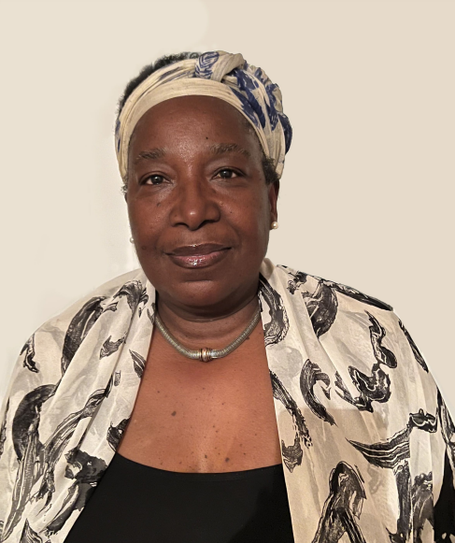 Elaine Baptiste
Elaine Baptiste
Elaine is a healthcare professional who wanted to be a nurse since age 12. She has just completed 48 years in the NHS, where she experienced many challenges that have shaped her professionally and personally. She is multiskilled and has recently discovered that she has good skills with older children and young people and can develop relationships and obtain cooperation in implementing treatment programs. Alongside this, she works as a union representative. She sits on several high-profile committees in which she can influence change and advocate for her clients and colleagues. More recently, she had managed to get additional funds to build a team to advance the continence service in the borough, which was previously under-resourced. She is currently training a new nurse to undertake treatments of children with continence issues and hopes that this will widen their range of services. As a lead, she is passionate about making a difference in the lives of the children she’s treating and have previously treated. She believes this service needs to be expanded and widely publicised to facilitate a more inclusive service locally. She began training to be a nurse at Whipps Cross Hospital in 1975; at that time, very few Black nurses were doing the state registered nurse training. She felt it was challenging because they faced a lot of discrimination and covert racism, but she enjoyed the training as best she could. She then did midwifery training at The London Hospital Whitechapel and had her eldest daughter during her training, which helped her to understand the technicalities regarding deliveries. Following her midwifery training, she returned to Whipps Cross to work night duties for 18 months, following which she did her psychiatric nurse training at the former Claybury Hospital. She then went on to do her health visitor training for Waltham Forest, where she worked for 32 years, now working as a paediatric specialist nurse, which she finds challenging but enjoyable and very rewarding.
One pivotal moment was being the only Black nurse working days on the general nursing side of Whipps Cross Hospital in the 70s. She had to learn resilience and ensure that hernursing practice was perfect. Another critical moment was working with abused children when she knew a child could slip through the cracks if she didn't practice safely. Another key moment in paediatric continence nursing is realising all the essential skills and knowledge she had from previous experience could now be utilised in dealing with very complex children and families and the rewards she gets from making a difference in a child's health issues is extremely rewarding. She is just seeing the positive outcomes for these children and families. There have been many challenges in Elaine’s career, and there have always been barriers to progression. The first barrier she came up against in her nursing career was at the interview for SRN Nurse Training; despite having more than the necessary training, she was encouraged to take the lesser qualification, which didn’t require any qualifications because it was easier. “I had to insist I wanted to do the SRN training and be forthright with it as I was overqualified”. “Another challenge was when I was working for Waltham Forest as a health visitor, and they wanted to make a significant cut to the services, so I wanted to do something about it. To combat this, I became a union rep to do something about it and formally respond to stop the cut being made”. Elaine states that the children of Waltham Forest with continence problems are getting an inferior service. Elaine has taken on this role, helping to educate parents, their children, her colleagues, and other professionals. She educates them on the importance of managing this condition properly to minimise its negative impact on their lives. This education has had a fantastic effect on the lives of the families and children she works with, and it’s a job she is very proud of. Her advice would be not to be afraid to follow your dreams and not let others put you off from what you want to do and enjoy the process.
There may be challenges, but challenges shape you. Elaine believes that diversity, equality and inclusion are essential, as they can combat biases and injustices, foster a better environment for everyone and build better relationships and cultural understanding. This ensures everyone gets fair treatment and the best service across the board. She believes that individuals and communities can better support and uplift Black women's voices and experiences by ensuring they are given equal opportunities for roles within their organisation. “As a senior practitioner, I often make it my business to encourage and direct more junior practitioners to advance in the organisation to more senior roles. Another way to support this would be having Black women's forums and promoting them widely to ensure the best attendance by Black women from different walks of life”.
One pivotal moment was being the only Black nurse working days on the general nursing side of Whipps Cross Hospital in the 70s. She had to learn resilience and ensure that hernursing practice was perfect. Another critical moment was working with abused children when she knew a child could slip through the cracks if she didn't practice safely. Another key moment in paediatric continence nursing is realising all the essential skills and knowledge she had from previous experience could now be utilised in dealing with very complex children and families and the rewards she gets from making a difference in a child's health issues is extremely rewarding. She is just seeing the positive outcomes for these children and families. There have been many challenges in Elaine’s career, and there have always been barriers to progression. The first barrier she came up against in her nursing career was at the interview for SRN Nurse Training; despite having more than the necessary training, she was encouraged to take the lesser qualification, which didn’t require any qualifications because it was easier. “I had to insist I wanted to do the SRN training and be forthright with it as I was overqualified”. “Another challenge was when I was working for Waltham Forest as a health visitor, and they wanted to make a significant cut to the services, so I wanted to do something about it. To combat this, I became a union rep to do something about it and formally respond to stop the cut being made”. Elaine states that the children of Waltham Forest with continence problems are getting an inferior service. Elaine has taken on this role, helping to educate parents, their children, her colleagues, and other professionals. She educates them on the importance of managing this condition properly to minimise its negative impact on their lives. This education has had a fantastic effect on the lives of the families and children she works with, and it’s a job she is very proud of. Her advice would be not to be afraid to follow your dreams and not let others put you off from what you want to do and enjoy the process.
There may be challenges, but challenges shape you. Elaine believes that diversity, equality and inclusion are essential, as they can combat biases and injustices, foster a better environment for everyone and build better relationships and cultural understanding. This ensures everyone gets fair treatment and the best service across the board. She believes that individuals and communities can better support and uplift Black women's voices and experiences by ensuring they are given equal opportunities for roles within their organisation. “As a senior practitioner, I often make it my business to encourage and direct more junior practitioners to advance in the organisation to more senior roles. Another way to support this would be having Black women's forums and promoting them widely to ensure the best attendance by Black women from different walks of life”.
Jane Ulysses Grell - Author, Poet and Storyteller
“Know your capabilities and exercise them against the odds. Let no one tell you that you can’t.”
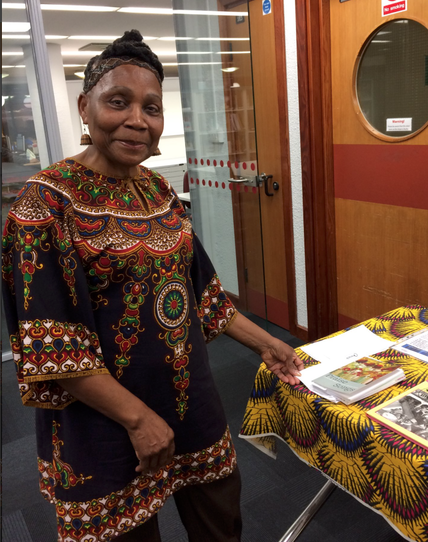 Jane Ulysses Grell
Jane Ulysses Grell
Jane was sent to high school at a time when most Dominican children had not the opportunity. She attended University in New York, thanks to the generosity of a distant relative who lived there. Attending University in Jamaica, Barbados, or Trinidad mainly was unaffordable. By chance, she became the penfriend of a young Basque whose aunt ran a girls’ hostel In Poitiers, France, where she did postgraduate studies in French language and literature. After settling in the United Kingdom, she began her teaching career in Hackney, East London as a French teacher. She later moved to Waltham Forest as a teacher of English as an Additional Language for bilingual students in primary and secondary schools. During this period, she discovered the power of storytelling and performance poetry to develop children's and young adults' literacy skills.
Her success in employing this teaching method led to a secondment to the BBC School Radio as an advisor, writer and presenter on multicultural school programmes. She delivers INSET –in-service training sessions to teachers in schools and education colleges. She undertakes engagements, presenting her work to audiences in the United Kingdom, from nursery schools to pensioners groups and in homes for older people. When she realised, from the experiences of her young daughters, how the British school system impacted children of African-Caribbean origin, she got involved in running Supplementary Saturday Schools: in helping to run LADDERS, an after-school club for secondary school-aged children; there, they developed their artistic talents and confidence through drama and dance. She finally gave up teaching French in favour of English as an Additional Language, where she could build literacy and culture through storytelling of the African-Caribbean Oral Tradition.
Her advice for young Black women is to believe in yourself. Find out what excites you, or you are good at and pursue it through every avenue open. Her thoughts on the importance of diversity, equality, and inclusion in various fields and industries are that she rejects clichés, where words don’t match actions. “We must be seen, heard and acknowledged at the forefront where possible”. Jane believes that individuals and communities better support and uplift the voices and experiences of Black women by using those (like herself) with a broader understanding of life to be listening ears and affirmers of young women, allowing them to make mistakes without overly harsh criticism while encouraging and aiding them to develop their strengths
Her success in employing this teaching method led to a secondment to the BBC School Radio as an advisor, writer and presenter on multicultural school programmes. She delivers INSET –in-service training sessions to teachers in schools and education colleges. She undertakes engagements, presenting her work to audiences in the United Kingdom, from nursery schools to pensioners groups and in homes for older people. When she realised, from the experiences of her young daughters, how the British school system impacted children of African-Caribbean origin, she got involved in running Supplementary Saturday Schools: in helping to run LADDERS, an after-school club for secondary school-aged children; there, they developed their artistic talents and confidence through drama and dance. She finally gave up teaching French in favour of English as an Additional Language, where she could build literacy and culture through storytelling of the African-Caribbean Oral Tradition.
Her advice for young Black women is to believe in yourself. Find out what excites you, or you are good at and pursue it through every avenue open. Her thoughts on the importance of diversity, equality, and inclusion in various fields and industries are that she rejects clichés, where words don’t match actions. “We must be seen, heard and acknowledged at the forefront where possible”. Jane believes that individuals and communities better support and uplift the voices and experiences of Black women by using those (like herself) with a broader understanding of life to be listening ears and affirmers of young women, allowing them to make mistakes without overly harsh criticism while encouraging and aiding them to develop their strengths
Dr Doirean Wilson - Higher Education Academic
“She is clothed in strength and dignity and laughs without fear of the future.” Proverbs 31-25
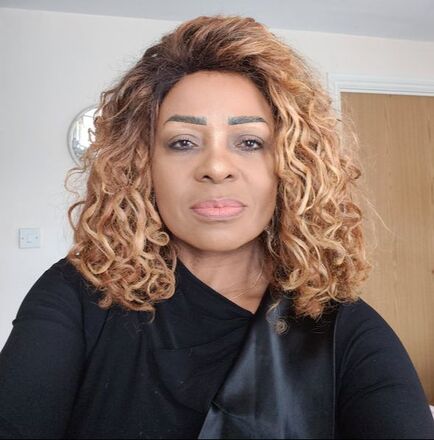 Dr Doirean Wilson
Dr Doirean Wilson
Nursing was Doirean’s first profession, and besides the medical knowledge learnt and patient care, she was able to develop her active listening skills, utilise her emotional intelligence, responsiveness in an emergency, ability to empathise, and patience and understanding, which was a must for building trust and security. Doirean was a former layout artist and journalist with `West Indian World Newspaper’, one of the first Black UK tabloid newspapers. She utilised her creativity to develop her visual designing skills to make the newspaper stories more appealing to a broader audience. She also honed her creative writing ability and unique journalist style, which resulted in her being given her weekly hair and beauty column. This led to an approach by Roz Wade, the then wife of Tony Wade, one of the three pioneering Black businessmen who founded the first Black hair and beauty empires in Britain, to become the face that launched the company’s `Natural Beauty` cosmetic products.
Doirean is a former TV Presenter for BVTV (Black Variety Television), where she wrote, produced, and presented programmes such as `Community Reports` and `Women on Women`; hosted and helped to organise award ceremonies, conferences and other events such as the `Voice` newspaper’s tenth-anniversary celebratory event. Being a former manager of five community projects led consecutively to addressing the under-representation of Black, Asian and other ethnic group members in critical roles across different sectors of industry (sustainable leadership, budget control, resource management, recruitment & selection, HR management, negotiating, report writing, fund-raising, employee relations, undertaking staff appraisals, disciplinary, developing HR and Business strategy). She was also a business consultant (commissioned by, e.g., the Learning & Skills Councils to enable their further education providers to address their inability to achieve their minimum EDIMS (Equality, Diversity and Inclusion Measures). In this role, she designed and delivered diversity awareness training and wrote development action plans to promote cultural awareness to enable these providers to be inclusive in their approach to cohorts of diverse learners. She was then commissioned by the Waltham Forest Black Mental Health Association to provide coaching and confidence-building training for users and their families as a coping mechanism to boost self-worth and to promote their assertiveness for coping with, e.g., trauma. She feels that these three key moments shaped her career.
The three `critical` lived learning experiences that Doirean regarded as significant, memorable and as the catalyst “for putting me on the pathway for recognising the person that I am today” are that of being a British-born child of mixed heritage Jamaican immigrants who arrived during the Windrush era. Who soon discovered that their standing in Jamaican society was of little significance, as the only thing that mattered is what was marketed as the “Land of Milk and Honey” where the streets were not paved in gold, was the colour of their skin. She was born two years after her mother arrived to join her father, where her welcome was the signs she saw displayed in the windows of numerous properties, which were “no blacks, no dogs, no Irish!”. She was raised to speak up, have a voice, and be proud of her cultural heritage; she found the colour of her skin and her worthiness as a Black Briton. Her parents explained that these are the ingredients of her identity, something they often reminded her was worthy of respect. She later realised that speaking up which was perceived as respectful behaviour in her parents` culture (speaking up and having a voice even though she was a child), was regarded as disrespectful in the British culture (children could only speak when spoken to), particularly back then in 1960s Britain, which was even worse if, like her, you were a Black child. This experience boosted Doirean’s inner `strength` and determination to be “the worthy person I knew I was, as taught to me by my parents”, regardless of the colour of her skin and gender.
Doirean’s awareness insights, teachings, expertise, and interventions continue to make a positive impact in the classroom, across the industry, nationally, and internationally by promoting awareness of cultural meanings of respect and how these meanings manifest in behaviours that have helped to address conflict among diverse teams of learners and employees. For example, as her study revealed, respect in one culture could be disrespect in another, “so we should not take this core commonly shared value for granted. My cultural awareness insights and the positive impact are why the university DEI module I wrote from my research is one of the most popular modules at Middlesex and is now delivered in Dubai, where it has had the same impact. These successes are why I was recently commissioned by the Metropolitan Police Service (MPS) to make them more culturally aware and to aid stop and searches for promoting relations amongst the Black community.” Her advice for young Black women is to find your inner strength to `feed` your soul, not let anyone’s issue be your punishment, and create an action plan of small goals you know you can and will complete, fulfilling your quest in life and your career.
Finally, being a Black woman is a unique gift and is a tag you should always wear with pride. She believes being diversity aware is a must, particularly in today’s increasingly global environments, and to nurture equality and inclusion is subject to cultural intelligence. These are the ingredients for harmony among those learning and working with others of difference and can mean the difference between business sustainability or failure, hence the significance of DEI. Doirean feels that individuals and communities can better support and uplift the voices and experiences of Black women through education, which she thinks is the key, also the means for sharing their experiences in schools, via social media, in the workplace and across broader society.
Doirean is a former TV Presenter for BVTV (Black Variety Television), where she wrote, produced, and presented programmes such as `Community Reports` and `Women on Women`; hosted and helped to organise award ceremonies, conferences and other events such as the `Voice` newspaper’s tenth-anniversary celebratory event. Being a former manager of five community projects led consecutively to addressing the under-representation of Black, Asian and other ethnic group members in critical roles across different sectors of industry (sustainable leadership, budget control, resource management, recruitment & selection, HR management, negotiating, report writing, fund-raising, employee relations, undertaking staff appraisals, disciplinary, developing HR and Business strategy). She was also a business consultant (commissioned by, e.g., the Learning & Skills Councils to enable their further education providers to address their inability to achieve their minimum EDIMS (Equality, Diversity and Inclusion Measures). In this role, she designed and delivered diversity awareness training and wrote development action plans to promote cultural awareness to enable these providers to be inclusive in their approach to cohorts of diverse learners. She was then commissioned by the Waltham Forest Black Mental Health Association to provide coaching and confidence-building training for users and their families as a coping mechanism to boost self-worth and to promote their assertiveness for coping with, e.g., trauma. She feels that these three key moments shaped her career.
The three `critical` lived learning experiences that Doirean regarded as significant, memorable and as the catalyst “for putting me on the pathway for recognising the person that I am today” are that of being a British-born child of mixed heritage Jamaican immigrants who arrived during the Windrush era. Who soon discovered that their standing in Jamaican society was of little significance, as the only thing that mattered is what was marketed as the “Land of Milk and Honey” where the streets were not paved in gold, was the colour of their skin. She was born two years after her mother arrived to join her father, where her welcome was the signs she saw displayed in the windows of numerous properties, which were “no blacks, no dogs, no Irish!”. She was raised to speak up, have a voice, and be proud of her cultural heritage; she found the colour of her skin and her worthiness as a Black Briton. Her parents explained that these are the ingredients of her identity, something they often reminded her was worthy of respect. She later realised that speaking up which was perceived as respectful behaviour in her parents` culture (speaking up and having a voice even though she was a child), was regarded as disrespectful in the British culture (children could only speak when spoken to), particularly back then in 1960s Britain, which was even worse if, like her, you were a Black child. This experience boosted Doirean’s inner `strength` and determination to be “the worthy person I knew I was, as taught to me by my parents”, regardless of the colour of her skin and gender.
Doirean’s awareness insights, teachings, expertise, and interventions continue to make a positive impact in the classroom, across the industry, nationally, and internationally by promoting awareness of cultural meanings of respect and how these meanings manifest in behaviours that have helped to address conflict among diverse teams of learners and employees. For example, as her study revealed, respect in one culture could be disrespect in another, “so we should not take this core commonly shared value for granted. My cultural awareness insights and the positive impact are why the university DEI module I wrote from my research is one of the most popular modules at Middlesex and is now delivered in Dubai, where it has had the same impact. These successes are why I was recently commissioned by the Metropolitan Police Service (MPS) to make them more culturally aware and to aid stop and searches for promoting relations amongst the Black community.” Her advice for young Black women is to find your inner strength to `feed` your soul, not let anyone’s issue be your punishment, and create an action plan of small goals you know you can and will complete, fulfilling your quest in life and your career.
Finally, being a Black woman is a unique gift and is a tag you should always wear with pride. She believes being diversity aware is a must, particularly in today’s increasingly global environments, and to nurture equality and inclusion is subject to cultural intelligence. These are the ingredients for harmony among those learning and working with others of difference and can mean the difference between business sustainability or failure, hence the significance of DEI. Doirean feels that individuals and communities can better support and uplift the voices and experiences of Black women through education, which she thinks is the key, also the means for sharing their experiences in schools, via social media, in the workplace and across broader society.

